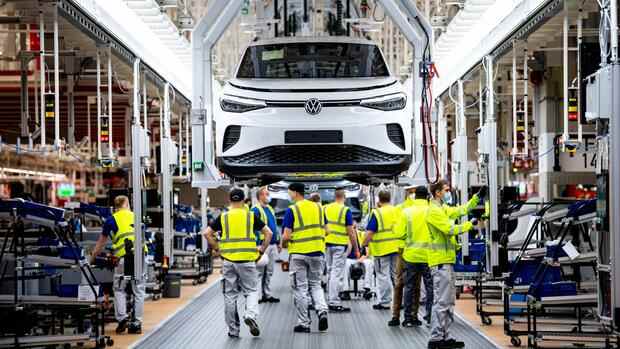Falling purchase premiums will have no impact on the generally high demand for electric cars.
(Photo: dpa)
The federal government will reduce the purchase premiums for electric cars in the coming year. And the first voices are already warning of a drop in demand for battery electric vehicles. The German Association of the Automotive Industry (VDA) also paints a nightmare scenario: the reduction in subsidies endangers the transformation.
The warnings are exaggerated. The electric car market in Germany is robust. The falling purchase premiums will have little impact on demand. And the German auto industry will not throw its long-term plans overboard either. The decisions at Volkswagen, Mercedes and BMW on the type of drive have been made.
All in all, the three automakers will continue to ramp down combustion engine production over the next decade. At the same time, they are converting their factories or building new ones in order to be able to meet the high demand for electric cars in Europe. They spend billions on it.
The purchase premiums only play a subordinate role in such long-term considerations. Businesses respond to market demand. And here the situation is clear, as figures from the Federal Motor Transport Authority show. New registrations of petrol and diesel vehicles have been falling for months. In June alone, registrations fell by 22 percent compared to the same month last year. At the same time, the registrations of battery electric vehicles are increasing.
Electric cars have the better selling points on their side. Although they are sometimes even more expensive to buy than combustion engines, they are already beating their fossil counterparts in terms of operating costs. The development of the new form of drive is also just beginning, while the combustion engine is fully developed – nothing more is coming. This means that the cost advantage will be even greater in the future.
Top jobs of the day
Find the best jobs now and
be notified by email.
FDP moves away from the industrial reality of car manufacturers
The tank discount enforced by the FDP, which expires on September 1, 2022, will not change that. Drivers of combustion engines will then have to get used to prices per liter of more than two euros. This is one of the reasons why a climate tax for diesel and petrol vehicles, which the Greens around Economics Minister Robert Habeck have brought into play, is obsolete.
Because an extension of the tank discount, which costs billions, is politically difficult to enforce in view of the much larger gas problem that Germany is heading towards with the approaching heating season. The cost disadvantage of the fossil drive type compared to battery-powered vehicles will also arise without this tax.
The car industry knows anyway: It can only meet the climate targets of the European Union if it produces more electric cars. From 2035 onwards, combustion engines will finally come to an end, when no new cars with petrol or diesel engines will be allowed to be registered in the EU.
At present, however, market demand is primarily characterized by affluent customers who would buy an electric car even without a purchase premium. This is partly due to the offer. Because the German manufacturers in particular are concentrating on expensive electric cars with high margins.
You argue with the high battery costs, which at the moment only really pay off for large cars. This calculation may work for the industry, but not for the majority of car customers. However, they will only be able to meet the overall climate requirements if households with medium and low incomes also replace their combustion engines with battery-powered vehicles.
The purchase premium should relieve precisely these households. It is possible that these people will now continue to drive their old cars with internal combustion engines.
This means that the reduction in purchase premiums enforced by the FDP is a double-edged sword. The German car industry, which is already saying goodbye to the small and compact class, can live with less funding.
Mercedes, BMW, Audi and Volkswagen no longer see their products for the masses, the raw materials will no longer be sufficient for this in the next few years. For small and medium-sized incomes, however, the electric car will become what it was at the beginning of mass mobilization in the last century: a dream that is difficult to achieve.
More: Traffic light lowers purchase premium for electric cars – plug-in hybrids no longer receive funding
